

|
Back to |
| The Front Page |
| People |
|
Return from the wilderness
an email interview with John Riches by Bob Alman layout by Reuben Edwards Posted April 14, 2006 |
|
||||||
John Riches of South Australia has carved out a unique place for himself in the croquet world as “the man you love to hate." His prominence on the Nottingham Board, croquet’s international email forum for serious players, is unrivalled. No matter how soundly he is excoriated for the positions he takes -and generally maintains against all assaults -the fact remains that he engages the attention of the most influential players in the game. For the most part, his arguments have to do with clarifying the laws of the game, a cause he long championed in many forums and as chairman of the Australian Laws Committee.But since his return from more than two years of missionary work on a remote South Pacific island, he has proclaimed “the gospel according to Riches” on many other topics as well. Whatever else he may be, Riches is clearly an effective catalyst for discussion of issues perennially at the heart of the sport. After a long absence from the Internet, he is back, ministering to the small, close-knit, worldwide village we know as the Nottingham Board. When he announced his return several months ago, it seemed like a good idea to ask what he had learned by "going native."
THE DISCUSSION BOARDS
You can subscribe to the Laws board or send an email by visiting http://lists.nottingham.ac.uk/mailman/listinfo/croquet-laws.You can subscribe to the main worldwide discussion board or send a message via http://lists.nottingham.ac.uk/mailman/listinfo/croquet.
BOB ALMAN: Did you always intend to come back to civilization, back to your Adelaide home, two and a half years later?
JOHN RICHES: When we went we intended to stay there for two years, but agreed to extend it until the end of the year.
BOB: Can we expect some instructive stories with moral lessons having to do with rustic simplicity and the innate wisdom of uneducated primitive peoples, and so forth? And of course enduring various hardships like no hot running water and toilet facilities?
JOHN: I wrote fortnightly "newsletters" to friends and relatives, intended as a sort of diary of our time away. I don't plan to write a book - I think most of it would be very boring.
BOB: I presume the lives of these people are somehow improved by learning English - even Australian English?
JOHN: For those who want to become educated, it's essential. They learn in village primary schools to read and write in their Bislama (pidgin) language, but there are no textbooks in Bislama, so if they want to go further they need English.
BOB: Did you play any kind of croquet while you were gone?
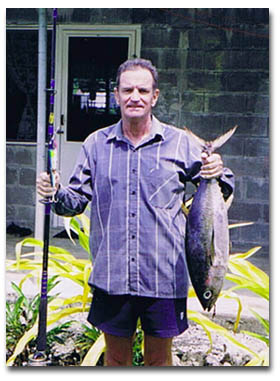
|
| Large fish abound in the deeper water outside the reefs and coastal islands. |
BOB: You must have played SOME games with the populace. What were they?
JOHN: They played soccer and volleyball, but I’m too old for such pursuits, so I spent my time going for walks or swimming in the local river (there were too many sharks and reefs in the ocean). In the evenings, when I ran out of preparation work to do for my lessons, I worked out chess openings. Chess has been another life-long passion of mine. In Vanuatu there was no-one to play with, but I worked out some good tricks to spring on my opponents in the next chess tournament I enter back here.
BOB: Could you just give us a sense of what the experience of being out of your normal culture for so long was like?
JOHN: My wife and I really enjoyed our time in Vanuatu, including even the many challenges and frustrations. The people were very friendly, the climate was very hot and humid, and life was relaxed and simple compared with western "civilisation."
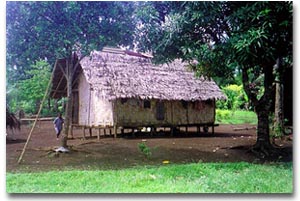
|
| The typical village house is constructed of do-it-yourself woven bamboo walls and thatch roof. |
We were sorry to leave our brown-skinned Melanesian friends and we came away loaded down with baskets, mats, shells and carved wooden souvenirs they had presented to us at a big farewell feast. We left mainly because we were getting too old and medical care is almost nonexistent on the island. In fact, we often had to treat local folk ourselves as best we could with whatever we had available, and without any medical expertise whatever.
We ate mainly vegetables and fruit, and we each lost more than 20 pounds while we were there, making us much healthier. Neither of us had a day's sickness. The locals can seldom afford meat, as most of them live their lives without having any money at all. If we wanted some beef or pork we had to go to a village, buy a live animal (there is no butcher shop) and take it home with us. The locals were happy to help us kill it, cook it (in the ground on hot stones) and eat it. There was no refrigeration, so you have to eat the whole lot on the day you kill it. When you have such a feast everyone is invited for miles around to help eat it, and of course they in turn welcome you to their feasts.
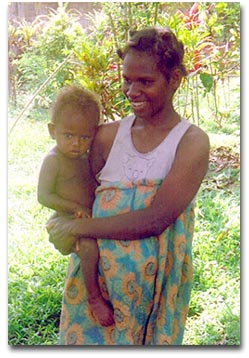
|
| A Melanesian woman in western-style dress and her 'pikinini'. |
Last year, for example, three village women upset a Magic Man from another village who promptly told them they would all die. (Perhaps they refused to "go to his house.") The three of them died in the same week. Their husbands, children and relatives were naturally not happy about this, so they caught the Magic Man, tied him behind a truck, and dragged him for some distance, almost killing him. It is likely that they were prevented from actually killing him only by fear of retribution from the evil spirits who had killed the women. Later he sued the village and its leaders for the equivalent of $100,000 in compensation (he lost an ear and had other fairly serious injuries). They had no money, but he was hoping they would have to give him land instead. The case is still before the courts, and because the laws are based on English and Australian law, the Magic Man is likely to win. The villagers cannot produce any evidence to prove that he caused the deaths of the three women. He says, "I didn't kill them; the spirit gods killed them. I only warned them about what would happen." In our justice system, telling someone they are going to die is not a crime!
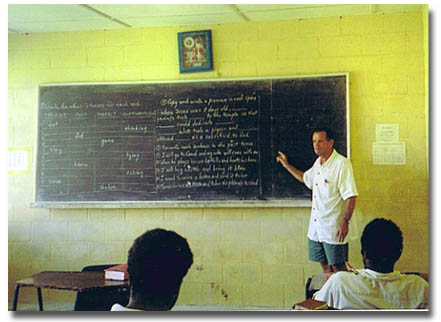
|
| Riches teaching an English lesson at Talua Ministry Training Centre. |
In another village near us a man, an elder in the Presbyterian church, was annoyed with his 9-year-old son, who took something from the house without permission, so he nailed the son's hands to a pole and left him there for 10 days, although he did feed him. There is only one town on the island, and there are police only in the town. They were not interested in taking any action, as they leave such cases out in the villages to be handled by the village chief who in this case was rather weak, and the father of the boy was one of his cronies. Some of the villagers asked us to help, but there was nothing we could do. Anyway, the boy recovered more or less fully, and is unlikely to ever take anything from anyone again without permission. The father is still a leader in the church.
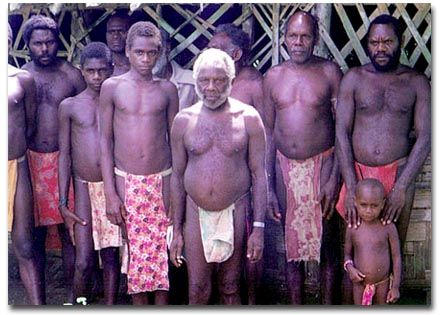
|
| The chief stands in from of a group of villagers dressed in traditional 'malmals' or loincloths. |
That will be enough for now - once I get started it is difficult to stop.
BOB: If only we had started Malletball before you left, you could have taken some of the equipment into the jungle and taught them croquet!
JOHN: I think they would rather go on a wild pig hunt, or some similar activity.
BOB: You commented in a recent LAWS discussion on the Nottingham forum: "To argue that the laws do not mean what the lawmakers wrote is to seriously denigrate those who were responsible for wording the laws. If that is true, then we need to have the laws rewritten by people who are capable of stating accurately what they mean.” I think it fair to say that you have a "fundamentalist" or "literalist" or "strict constructionist" philosophy with regard to understanding and applying the laws of your religion as well as the laws of your favorite game. Is that not true?

JOHN: There is indeed a correlation between my approach to scripture and my approach to the croquet laws. You are right to label me a "fundamentalist" with regard to Biblical interpretation. I accept the title gladly. Perhaps it is fair to say that my approach to the croquet laws is also "fundamentalist." To me that would mean that you go only by what is stated in the laws; you do not question whether it is right, or whether it may not be what the writers of the laws intended to say, or whether you and others consider it to be "reasonable and fair." They said it, so you accept it and play (or referee) accordingly. Scripture - and the croquet laws - should be interpreted and applied literally, logically. They should be written in such a way that they can be interpreted literally and logically.
It also means that laws should be interpreted consistently. That is, in order to understand what a law means you must compare it with other laws and find a meaning for the terms that can be applied when the same terms are used in other laws; and if your interpretation of a law results in it contradicting another law, then you must conclude that your interpretation is wrong. You cannot simply accept that the same words in the same law mean different things when applied to different situations. It's similar to “comparing scripture with scripture” - if the scriptures appear to contradict themselves then you are interpreting and understanding them incorrectly.
A good example of this is the one that I first upset the laws establishment by raising many years ago: At that time the laws said that a ball may run its hoop in two or more strokes, but "if it becomes a ball in hand during the running of the hoop it must begin to run the hoop afresh." They also said that the running of the hoop is "not completed until the ball comes to rest on the non-playing side of the hoop"; and "any ball in play becomes a ball in hand when it crosses the boundary." I pointed out that putting all this together means a ball which passes through its hoop and goes out over the boundary in the hoop-running stroke has not scored the hoop and must make the hoop again. It has nothing to do with interpretation; that is what the laws say, regardless of how you read them. I never sought to take advantage of this in a game, but I did say that if a player asked me to rule on this situation as a referee -in a MacRob match, for example - I would have to apply the laws as stated and rule that the hoop had not been scored. It was irrelevant that the lawmakers may possibly not have intended it to be applied that way, or that the laws had traditionally and consistently been applied incorrectly. With the laws so worded it would not be acceptable to say that a ball which crosses the boundary becomes “in hand” in most situations, but not if it has just passed through a hoop. Laws are laws; you are not entitled to change them because you think them unfair or you do not like what they say, or because others have been misapplying them. Even the International Laws Committee do not have the authority to change the laws without the agreement and approval of the various Associations - although some of their published “rulings” or “interpretations” amount to changes rather than clarifications which are therefore in my opinion out of order and should be ignored.
In this case, the laws were quickly changed - which took some achieving, but at least it was easier than changing scripture - and there was then no further problem. My attitude was that a player had no right at ask a referee to rule other than according to what is stated in the laws. Claims that it was "unfair" or "it has never been applied that way" or "it is not in the spirit of the game" have nothing to do with it. (Incidentally, it would be possible to argue that my literal interpretation would have improved the game by discouraging players from crashing or bashing their balls through hoops.)
BOB: That’s very clear, but I want to follow up on your comment on “changing scripture.” As a Baptist, you presumably embrace the Protestant Bible as the divine and inerrant word of God. That is, the ultimately refined "book of laws" - embracing, presumably, both the Old and the New Testament. Given the many differences in interpretation of these laws (which presumably has given rise to the differences between Presbyterians and Baptists, not even to mention the difference been Catholics and Jehovah's Witnesses) how can you claim to know with certainty the correct - or divinely ordained - interpretation and how it should be applied to human behavior in the 21st Century in particular and sometimes very complex ethical contexts?
JOHN: By the way, although I am a Baptist I was teaching in Vanuatu at a Presbyterian college where we also trained pastors, priests, lay-people and missionaries for other denominations such as Anglicans, Church of Christ and other Protestant denominations.
1. Each person is expected to read scripture for himself and apply what it says - not what he thinks it should have said - to himself and his own life. There are some areas which are not clear and where understanding will differ. I have no right to expect a Presbyterian to live by my understanding of such areas, and he has no right to try to force me to accept his understanding. Everyone at the college knew I was a Baptist. I generally avoided raising or making an issue of the few slight differences in theology, but if I was asked about my beliefs and my understanding of scripture, I was happy to explain and give reasons for them. The main differences were in tradition and religious practices where we preferred to do things differently, but neither view conflicted with what is stated in scripture.
BOB: I have to persist here, by asking you how you can embrace or defend all the “abominations,” for example, in the book of Leviticus as having any possible application to modern life. The abomination of eating shellfish, for example, or of mixing the threads of two different fibers in the same garment. Or the statement that it’s okay to sell your daughter into slavery, so long as you sell her to someone in another country. How can you take seriously a document that puts forth such “laws” for human behavior -much less regard it as the inerrant word of God and a fit guide to moral behavior in the 21st Century?
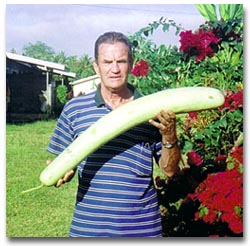
|
| The "long bean" Riches holds, along with sweet potatoes and bananas, constituted the staple diet of Riches and his wife, who each lost more than twenty pounds in their two and a half years in Vanuatu, in excellent health throughout. |
The rules given by Moses for the orderly conduct of ancient Israelite society were given for various reasons, some of which are uncertain and subject to theological debate. Briefly, my answer would be: (1) Some fish “without scales” found in middle-eastern waters are poisonous. (Incidentally, while I was in Vanuatu we had four students almost die from eating poisonous shellfish.) It is likely that this law was given for the protection of God’s people. (2) Some laws were given for pragmatic reasons. Mixing fibres could mean that one fibre would wear out long before the other. The rule seems to have had positive effects, since the clothes made by the Israelite people in Moses’ time after this rule was given “did not wear out for forty years” (Deat. 8:4)! Some also see this rule as a symbolic reminder for the people that true religion must not be mixed with false religion, similar to the lesson taught by Jesus centuries later about putting a new patch on an old garment, or putting new wine in old wineskins. (3) I think you may have misunderstood scripture here. Ex.21:8 actually prohibits the selling of slaves to foreign nations.
It's true that slavery is not condemned in the scriptures. Slavery was preferable to dying of starvation. Slaves are told they must obey their masters and work hard for them, while the masters must treat their slaves well and provide for their needs. Slaves also had to be freed after seven years or in a year of jubilee. But these laws did not apply in foreign nations, so you could not sell an Israelite as a slave to someone from another nation.
These Old Testament laws do not necessarily apply to our society today, since the New Testament tells us that we are “not under law, but under grace.” Their relevance is mainly that they reveal God’s caring nature for the health of his people, for women as well as men, for their spiritual well-being, and even for things like how long their clothes will last.
BOB: You indicated that although Vanuatu may be the most Christian of nations, there is little understanding of Christian theology. They are following the form, but don't get the substance. Presumably, your mission there was partly to elevate their understanding through training native ministers and teaching English, which will ultimately give them a better basis for education of all kinds. So far, so good. But my observation of Christianity is that precisely the same situation obtains in "advanced" countries. That is, the form is followed, but they don't understand the import of what they're doing, they just follow the rules and the interpretations of their preachers or national ecclesiastical bodies - or in the case of the Catholics, the Pope, in his role as the infallible interpreter of "the laws." So it seems to me that the understanding of the spiritual basis and value of religion is not necessarily a product of education. Could you comment?
JOHN: Yes, indeed; the same shallowness and lack of understanding is evident in Australian churches, and I guess in many churches all over the world. The main reason for teaching English to the students in Vanuatu was so that they could read and study the writings of men like Aquinas, Luther, Calvin, etc., which are not available in Bislama or their village languages. But it also helped them if they wanted to later pursue studies or apply for jobs in other areas -for example law, science, tourism, accounting, and so on.
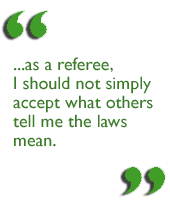
The parallel between my approach to scripture and my approach to the croquet laws is that as a referee I should not simply accept what others tell me the laws mean. I must check it out for myself and go by what is actually stated in the laws. Of course, I cannot expect others to accept my understanding of any law without question, either. I am constantly amazed that when they are asked to rule on a difficult and unusual situation most referees will run around and ask the opinion of other referees, and end up being confused by a multitude of different offerings. It seldom seems to occur to them that the only sensible thing to do is to get a rule book, read what it says, and go by that. But a problem here is that the laws must be comprehensible to ordinary people, and unfortunately some of them are not. We succeeded in ensuring that the revised laws cover many points that previously were not adequately covered but we were largely unsuccessful in our attempts to have the complicated laws simplified and to have unnecessary laws removed from the book.
BOB: Okay, now I'd like to ask a question strictly from left field: I have a notion that in the 21st Century there is an increasingly significant parallel between the practice of religion and the practice of sport. I remember when my mother used to visit me in San Francisco when we were a fairly young club and therefore had to have our events on the weekends, and there was usually a croquet event on Sunday morning, and she would say in exasperation, “Don’t ANY croquet players go to church?” and I would say, “Oh yes, but I think they all have a choice about it, they can go only when they please.” I would never suggest to her that people can get a lot of what they get from religion in the croquet club, on the lawn, in the game - and without all the mind-numbing dogma -but since this is your interview, I won’t elaborate my views on it. What are yours?
JOHN: I cannot agree with your sentiments here. Croquet cannot in any way provide the things a person misses out on if he is not serious about his religion. It can provide an opportunity for socialising, but that is not what true religion is about. Even if you become world champion your croquet ability will not earn you a free pass into heaven. For many years I have not played in major croquet events when they are held in Adelaide because I prefer to attend my church on Sunday. Many players ask me about it, saying, “But surely they would understand and let you play in the national championships!” I explain that our church has no rule about Sunday sport. Our eternal salvation does not depend on whether or not we play sport on Sundays. But when I joined the church I made a commitment to support the work and worship of that particular church to the fullest extent I could, and I meant it. I always do my best to keep any commitment I make. I do not play croquet on Sundays because I would rather be in church - it is as simple as that. Worshipping my God and serving him is far more important to me than playing any sport. The same commitment has affected my career in other sports during my earlier years - tennis, basketball, football, squash, chess. In all of them, I have had to forgo opportunities to play in selected A-level teams, but I have not regretted one moment of it. However, I will sometimes play on Sunday when I'm on holiday in another state, as I have made no commitment to any particular church there.
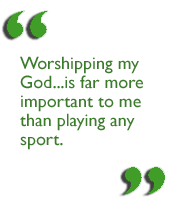
BOB: Okay, clear enough, let's switch gears here: I have done many kinds of technical writing in a long career in corporate communications, and that includes writing various versions of croquet rules, so I think I understand the process and appreciate the value of getting broad input to rules so they can be progressively perfected over time. However, I have also frequently found that amateurs really don’t understand the benefits of this, and so there have been numerous examples of USCA publications (for example) published without extensive review, to the eventual regret of their authors -who typically were good fellows trying to “help out” and having no clue about the professional standards that would apply to what they were doing, no appreciation of the rigors of language, no understanding of how different minds receive and interpret the same words, no anticipation of all the unforeseen circumstances in which these words would be interpreted in particular circumstances and reinterpreted and questioned. The problem as I see it, frankly, is that amateurs don’t understand what it take to produce good technical writing. And rules -or laws -should be regarded as highly technical writing, which, you and I agree, should be done very, very carefully, and perfected over time, to the extent that is possible. So isn’t the best resolution of this issue dependent on appointing highly qualified people from each of the associations and in the World Croquet Federation to be responsible for the laws, rather than well-intended amateurs who have no education in the uses of technical language?
JOHN: Certainly. And they need to understand that effective communication requires that people everywhere mean the same things, at least most of the time, when they use the same words. If there's any room for doubt about the meaning of a word, then there is an onus on the speaker or writer to give a definition, but although John Hanscomb and I agitated strongly for it, that is something the laws fail to do now in many cases. For example, several laws say that a ball must be “replaced” on a yard-line, which is only possible if the ball had previously been on the yard-line. The ORLC ["Official Rulings on the Laws of Croquet," a commentary published by the International Laws Committee] says that the word “replaced” includes balls that have been left in the yard-line area and not replaced. That, of course, is nonsensical. The meaning of the term “replaced” cannot be “interpreted” as also meaning “not replaced”! Including balls which have not actually been replaced is clearly a change to the law, not merely an interpretation.
BOB: I think I understand what you’re about with respect to the laws: You want them to mean what they say, and you want to people to act as if the laws mean what they say, and if in the course of testing and experience some weird things happen as a result, what you say is, “Well, you have to obey the laws for now, but now you can see how it should be adjusted.” But instead, what you have is a lot of people who say, in these cases, what “the spirit of the laws” is, and what that "spirit" dictates in particular cases.
Now, is there any provision in the Laws for an appointed body to determine “the spirit of the laws” as distinct from the rigorously interpreted meaning of the laws one would derive from the language alone? Is there or should there be an ongoing “Talmud” as a guide to interpretation? Or should the official bodies insist that everything be clearly represented in the written Laws alone?
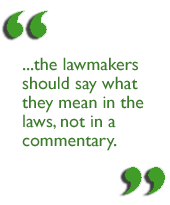
JOHN: I would not deny that there may be a "spirit" of the game, but we play according to what the laws say, not what the spirits say. I have pointed out previously that people may have vastly differing opinions about what is the "spirit" of a particular law, and in croquet there is no satisfactory way to determine between true and false spirits. The laws do say that in cases where the interpretation of a law is uncertain we should refer to the commentary in the "Official Rulings on the Laws of Croquet." In my opinion this is not the way to go. If the lawmakers are capable of saying what they mean, then they should do it in the laws, not in a commentary. I have no objection to someone publishing a commentary which shows how the laws have been or can be applied to various situations, but the commentary should be seen as having no official standing or authority, and the law should written in such a way that the average person can apply it correctly to various situations without needing to refer to a commentary.
BOB: John, I have to remind you that even before you went away to Vanuatu, when the dialogue on the Nottingham Board had become acrimonious at times, you announced that you were "retiring" from the conversation. Now you're back, and obviously your presence has enlivened the board considerably. But some have commented, "John Riches is back now, and he has hijacked the Nottingham Board." How do you respond to that accusation, and what are the prospects for the indefinite continuation of the John Riches Laws Debate on the Nottingham Board?

JOHN: I withdrew from the Board because some people who agreed with me were being insulted unfairly, merely because they supported my views. I did not want to be the cause of such deplorable behavior, although I did not mind in the least what people said about me personally. I claim the right to express my opinion on any matter if I choose to do so in what is billed as a “public forum.” I get many private emails from people who agree with me and seek my help on various laws or coaching matters, and many express gratitude for my assistance. I will continue to help where I can, and for as long as I can I will probably continue my “crusade” to draw attention to things that I think are wrong in the croquet world and point out how I believe they can be put right.
BOB: You’ve had plenty of time now to absorb and review whatever impact the years on Vanuatu have had on your life and your values, now that you’ve had six months to settle back into whatever your civilized routine might be. Did you come back with any new perceptions of man's place in the universe, any rearrangement of your priorities, any major decisions about the conduct of your life and relationships?
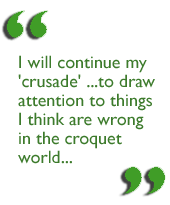
JOHN: We miss our many Melanesian friends and the fact that there would be a steady stream of people calling on us at all hours of day and night seeking help in various ways. They had virtually no money and few possessions (but plenty of food) yet in general led a much happier existence than most people in our materialistic Western societies. Although their understanding of God was limited, they realised that man’s place is to worship him, serve him, thank him for all the blessings he gives us, and demonstrate his love to our fellow-men. All else - even croquet - is peripheral.
BOB: In straying beyond discussion of the laws - on which you are an acknowledged expert - you have raised an outcry on other issues, including your proposal that interaction with spectators be promoted to make the games more interesting. How do you account for the violent opposition you have encountered to these suggestions?
JOHN: I find it hard to understand why such suggestions should draw so much ridicule and out-of-hand dismissal. The arguments against my proposals have mainly concentrated on the things that would not noticeably change the way the game is played. Yelling out advice has been accepted (we are told) in Egyptian Golf Croquet events without any serious problems. The other change to the laws, such as end of turn for all nontrivial errors, has drawn very little comment, and of the few comments that have been made there were as many in favour of the change as against it.
BOB: But you seem to think that the game itself cannot be popularized without changing the culture of croquet in radical ways.
JOHN: Many people will insist they’d like to see the game popularized, but they have no suggestions as to how to do it: simplify the laws; allow the giving of advice; remove all dress regulations; have a hit-up before every game; stop requiring a player to help his opponent avoid making mistakes; stop requiring a player to give decisions against himself; allow players to practise on any vacant lawn during an event; have an amplified running commentary for important events; organise cheer squads and ball-girls in short, frilly skirts, etc.. Sure, it would change the game a bit, just as the new laws have changed and popularised Golf Croquet; the introduction of new laws and removal of archaic dress regulations (these changes were insisted upon by marketing people) has changed netball and made it more attractive to both players and spectators; and new one-day rules with colourful dress have immensely popularised cricket. The main aim is not to change the game, but to change the way we croquet people see the game. Most croquet players see it as an elitist activity for “It’s not cricket, sir” gentlemanly types, not suitable for teenagers and not the sort of activity one should get really excited about. Just ask any croquet-playing teenager how often he has been asked - by croquet players - why he is not playing a more active sport!
BOB: At this stage of your life, what is your life about? It’s kind of a nasty question that I have asked myself often, and that I have been asked often, myself. It goes like this: “With all the things you’ve done in your life, all the good works, all the strong stands you have taken in areas that people would agree are important, how do you justify spending so much time and energy on something trivial, on something that doesn’t matter: that is, on croquet?"
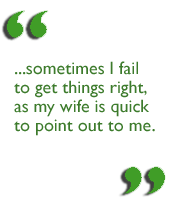
JOHN: I’m not sure that I can justify it. I need to ensure that I give priority to more important things, and sometimes I fail to get things right, as my wife is quick to point out to me. Croquet is a fascinating game that provides useful physical and mental exercise and should be enjoyed by thousands of people, especially under lights on a summer evening in Australia. I try to help them gain more enjoyment by coaching them to achieve a higher standard of play. I would like to help bring about simplified laws which would also help, although this does not mean that I necessarily want to rewrite the Laws myself. Once again I have a stack of letters from people saying how much they have appreciated the help they gained from my booklets. None of this is likely to have real lasting value in the overall scheme of things. I do not have any desire to be remembered after I have left this earth. The enjoyment and satisfaction I get from playing and coaching croquet is enough in itself. But there is a spin-off when I am asked to talk at a croquet club social function about my time in Vanuatu, so I can tell them why we went and what we did over there, which may hopefully help them to see that (since I was prepared to give up croquet completely for such a long time) there must be things in life that are more important than sport.
BOB: Do you enjoy argument for argument’s sake -that is, debate in the sense of “scoring points” quite aside from searching for the truth or some appropriate conclusion to a conversation?
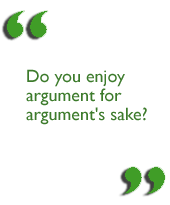
JOHN: That is a difficult question to answer. I don’t think so. I enjoy thinking deeply about the laws as a form of mental exercise, and I do not like to see people misunderstanding and misinterpreting the Laws when there is a chance I can help to put them right. I think it is more that I am a “born teacher.” The laws debates also help me to gain a more complete understanding of the Laws myself.
BOB: You have an intense conviction of the correctness of your own interpretations of the croquet laws, without benefit of a law degree or a Ph.D. in logic. How did that happen?
JOHN: I have majored in logic, taken honours in logic, and lectured in logic at university level. That helps me to immediately recognise illogical arguments and interpretations when I see them. I make no claim to infallibility and at times you will have noticed that I have been prepared to admit that I was wrong - something many others seem unable to bring themselves to do. But before I will accept that I am wrong I need to be convinced by sound argument, not just told that the majority of croquet players do not agree with me.
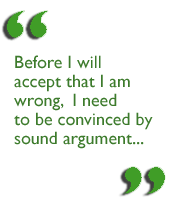
BOB: At one time -when you were chairman of the Australian Croquet Association Laws Committee in the mid-nineties, you did a remarkable thing: you encouraged the publication of a book which was intended to be a model of the way the laws SHOULD be written. What did you intend to achieve with that publication, and what did you actually achieve?
JOHN: It was Peter Olsen who decided to publish his own version of the laws book. I and others on the Australian Laws Committee agreed to help him. It was designed to show that the laws could be rewritten more simply and more comprehensively. Peter’s motivation was that we were getting nowhere by just pointing out the many deficiencies in the laws and asking for changes to be made. We had to actually show how it could be done. Quite a few of our ideas and some of our wording was used (without acknowledgment) in the revised laws.
Long before that I had written a book, assisted by John Hanscomb, called “Croquet: Problems of Laws Interpretation." It listed hundreds - literally - of inconsistencies, ambiguities and deficiencies in the laws, and instanced hundreds of situations that were not adequately covered. That book stirred up a hornet’s nest and made people realise that a revision of the laws was an urgent necessity. Most of the problems were corrected in the revised laws, which was a great step forward.
BOB: In your relative retirement, now that you have done your time in the wilderness, what do you hope to achieve?
JOHN: I find many ways to make myself useful. I write Bible studies for use in our church “Fellowship Groups,” do some guest preaching or lecturing on occasions, teach English to migrant refugees from Asian countries, play and coach croquet, help train coaches and referees, teach chess, play the piano or organ for church services - all on a voluntary basis - and also manage to find time to write an occasional email.
BOB: All right, John Riches. You are well known for liking to have the last word, so I'm going to give you that courtesy now. Considering everything that has gone before in this interview: What is your last word?
JOHN: Amen.